News
YEAR OF NEWS :

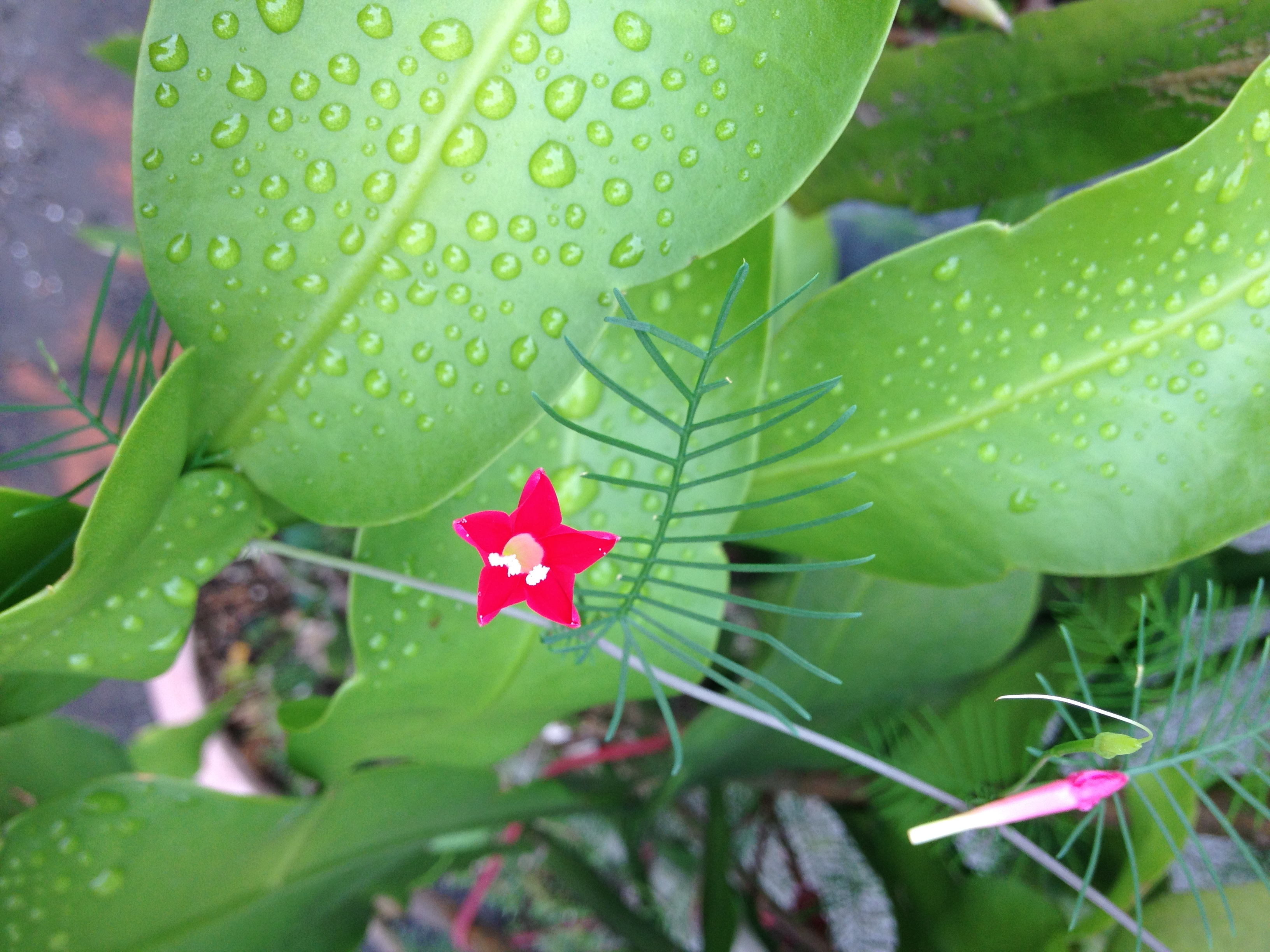
Monday, December 25, 2017
The state of one's mind tends to be susceptible to temptations and stimulations in the external environment, thus creating emotional fluctuations ranging from uneasy feelings to severe loss of equanimity. If one employs the safeguard of protecting the spiritual environment when situations arise, one can simply maintain calmness and inner stability, or go deeper to become free and at ease.
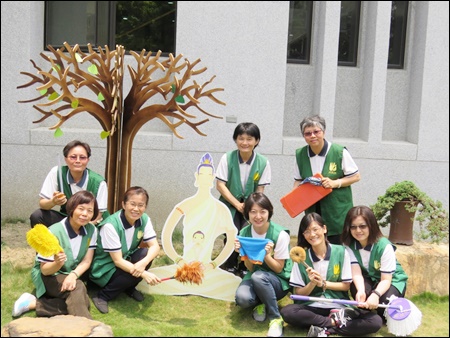
1. Attaining the insight of unconditioned Dharma
2. Developing diligence
3. Attaining great wisdom
4. Attaining rebirth as a Wheel-turning King (Skt. chakravarti-raja)
5. Enjoying wealth and prosperity on earth or heavenly realm
6. Having extensive descendants
7. Enjoying longevity without suffering diseases
8. Winning the protection and support from benevolent deities
9. Eventually attaining the supreme Buddhahood
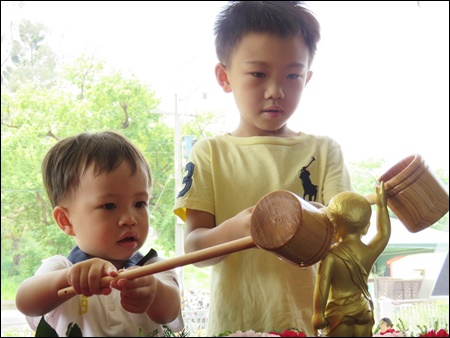
To perform the ritual, practitioners first bow to the Buddha and then scoop the scented water and pour it over the statue of infant Prince Siddhartha, and repeat the same process for two more times. Meanwhile, participants chant Shakyamuni Buddha’s name and the Bathing-the-Buddha Gatha, to wish all beings to leave behind afflictive defilements, and soon realize the pure Dharma-body of the Tathagata.
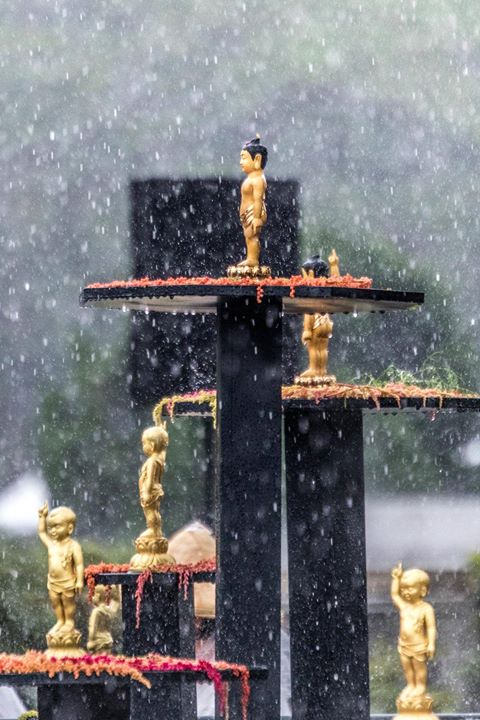
Bathing the Buddha has a profound meaning.
While pouring fragrant water over the statue of Prince Siddhartha, we must sincerely pray: “I now bathe all Tathagatas, pure wisdom as adornment and with the accumulation of merit and virtue. May sentient beings in the world of Five Turbidities leave behind defilements and soon realize the pure Dharma-body of the Tathagata.”
Through the merit of bathing the Buddha, we should aspire to purify our bodily, verbal, and mental actions by eliminating our greed, hatred, and delusion. This is the real meaning of bathing the Buddha.
The birth of Buddha into the world brought spiritual serenity and a path to liberation for confused and lost sentient beings. Therefore we hold the Bathing the Buddha Dharma Assembly to celebrate the Buddha’s birthday, showing our gratitude to his kindness.
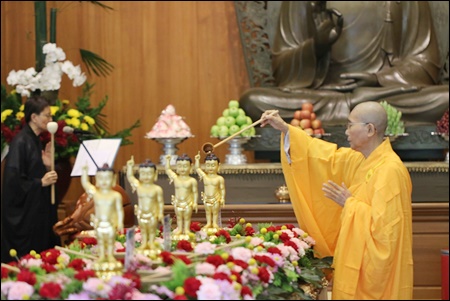
Why do Buddhists perform the ritual of bathing the Buddha on Shakyamuni Buddha’s holy birthday, and why is it called the “Bathing the Buddha Festival”?
Legend has it that over 2600 years ago Queen Maya of Kapilavastu gave birth to Prince Siddhartha, who later became Shakyamuni Buddha, under a sala tree in the Lumbini garden.
Upon his birth, there were nine dragons pouring fragrant water to bathe the infant prince’s body. Then he took seven steps, with one hand pointing towards the sky and the other towards the earth, and said, “In heavens and on the earth, only I am singularly supreme.”
This indicates that, having gone through three great incalculable eons of practice and about to attain Buddhahood in the human realm, he was the most superior among all the heavenly and human beings. Since then, Buddhists have been celebrating the Buddha’s birthday as a tradition by performing the Buddha bathing ceremony.
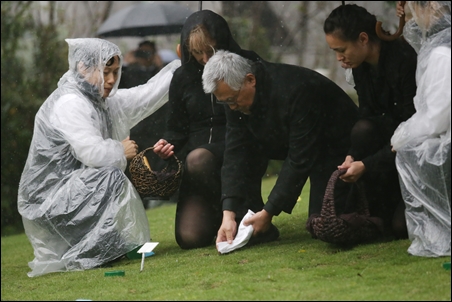
Abiding by his last wish, the ash burial ceremony of the late Eighth Vice President of Republic of China, Mr. Lee, Yuan-Tsu, was held at 2.00 p.m. on March 31, 2017 at the Eco-Friendly Memorial Garden of Dharma Drum Mountain World Center for Buddhist Education. Led by honor guards, representatives of the family held his ash box and slowly filed along the winding trail lined with cherry blossoms and banana magnolia trees. Late Mr. Lee’s wish for a natural burial was fulfilled after the hundred participants made their silent prayer and shared their recollections.
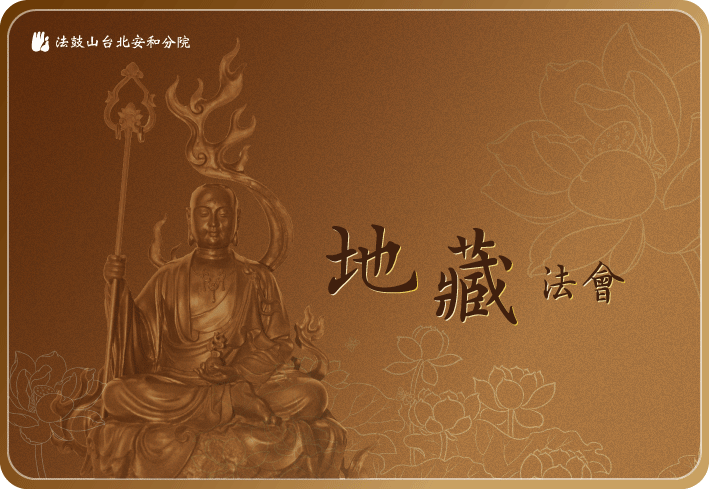
Based on the Sutra of the Past Vows of Earth Store Bodhisattva, the assembly reflects the Buddhist spirit of great filial piety.
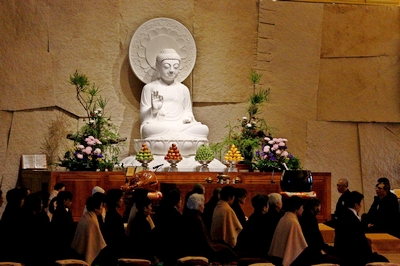
As a way to show gratitude and repay kindness, the seven-day Amitabha Recitation Retreat is a popular event for many practitioners during the Tomb-Sweeping Festival. Of various Buddhist methods of practice, reciting Amitabha Buddha’s name is a most straightforward and effective way to help us gather our mind and live in the present. By reciting Amitabha Buddha’s name in one-minded concentration without confusion and distraction, we will be more able to calm and settle our mind.
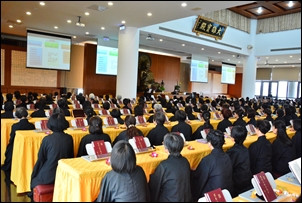
The Concept of Repaying Kindness: To Benefit All Sentient Beings through Actual Practice
Purifying our minds and society through diligent practice of the Dharma at the Dharma assembly:
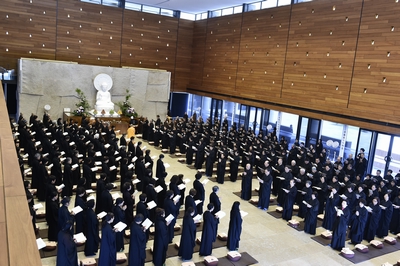
In Chinese culture, the Tomb-Sweeping Festival is a time to pay respects to one’s ancestors, by remembering their kindness and the value of filial piety.
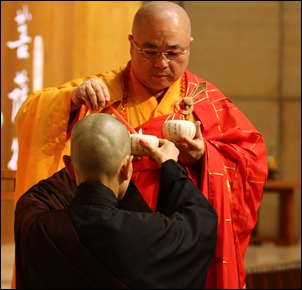
The annual Transmitting the Light of Dharma ceremony was held at the Dharma Drum World Center for Buddhist Education at 7:00 p.m on Febuary 4, 2017. The ceremony was broadcast in real time to its 12 branch monastries across Taiwan via video-conferencing.

PAGE :
1
2
3
4
5
6

|